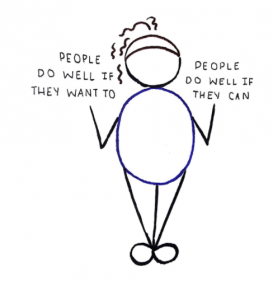If you work in any field where your primary role is to aid or act as a caregiver to those who’ve experienced mental health challenges, you may have, at some point or another, felt feelings of apathy, exhaustion, loneliness, and/ or negativity. What you’re experiencing is called compassion fatigue, or the gradual lessening of compassion over time, and it’s very common, experienced by between 40% and 85% of professionals in these fields.*
Later, we’ll examine compassion fatigue in more detail, but for now, we’ll focus on compassion-based resilience, or the ability to maintain your well being while working to effectively support people who deal with complex life challenges. The first step is to examine our beliefs about human behavior as they relate to growth. This will establish a connection between compassion and trauma that is critical to understanding how we receive and respond to suffering.

So the question we want to ask is, is growth a matter of motivation, or is it a matter of having the necessary abilities and supports? In other words, do people do well if they want to, or do people do well if they can?
According to
Ross Greene, an esteemed psychologist who created Collaborative & Proactive Solutions, or CPS, a model to find solutions to behavioral challenges, the belief that “people do well if they want to” is common but, generally, incorrect. It implies that people, whether patient, child, or student, are uncaring of their success and unmotivated to achieve it. And it requires the motivator, whether caregiver, parent, or teacher, to force growth, thereby limiting their role to enforcer. In these cases, the issue is often left unresolved, because the core concern hasn’t been addressed or managed correctly.
According to Ross Greene, this directly counters the belief that “people do well if they can”, which is not only correct, but far more helpful. Instead of blaming people, it addresses whatever third-party obstacle is blocking their success. At that point, people are seen as lacking the skills required and coping in what ways they know how. And it requires the supporter to collaborate and problem solve, thereby changing their role to enabler. Success then comes from working together to figure out the best solution, which can be used to solve any similar problems thereafter.

So what do we need to do to make less “do well if they want to” people and more “do well if they can” people? Firstly, we need insight, which comes from the planning and practice of collaborative problem solving, using the “do well if they can” attitudes and techniques. We also need to give the “do well if they want to” people time to let go of their unhelpful behaviors and adapt a new approach. It’s important not to place blame, and to remember that the “do well if they want to” people’s behavior is well meaning. We need to gradually expose the people we are trying to support to triggers while giving them the support for maintenance they need, which includes time to refresh. Lastly and, perhaps, most importantly, we need to give them realistic and relevant hope.
Take some time to reflect on if you’re a “do well if they want to” or “do well if they can” person and what you can do, in either case, to progress your work and yourself. Ask yourself what your professional role is in the two different mindsets. Think of an experience from your own career when you believed a person “could if they wanted to” and your belief about that person changed. Don’t forget to check in next month for our latest post, sign up for the WISE newsletter below, attend a WISE meeting to get more involved, or visit our website at
https://eliminates-44824606ed-bfbkh6ageja5h4c0.a01.azurefd.net/.
Thanks,
Lucy, and the WISE team
*Mathieu, F. (2012). The Compassion Fatigue Workbook. (Routledge, NY).
 So the question we want to ask is, is growth a matter of motivation, or is it a matter of having the necessary abilities and supports? In other words, do people do well if they want to, or do people do well if they can?
According to Ross Greene, an esteemed psychologist who created Collaborative & Proactive Solutions, or CPS, a model to find solutions to behavioral challenges, the belief that “people do well if they want to” is common but, generally, incorrect. It implies that people, whether patient, child, or student, are uncaring of their success and unmotivated to achieve it. And it requires the motivator, whether caregiver, parent, or teacher, to force growth, thereby limiting their role to enforcer. In these cases, the issue is often left unresolved, because the core concern hasn’t been addressed or managed correctly.
According to Ross Greene, this directly counters the belief that “people do well if they can”, which is not only correct, but far more helpful. Instead of blaming people, it addresses whatever third-party obstacle is blocking their success. At that point, people are seen as lacking the skills required and coping in what ways they know how. And it requires the supporter to collaborate and problem solve, thereby changing their role to enabler. Success then comes from working together to figure out the best solution, which can be used to solve any similar problems thereafter.
So the question we want to ask is, is growth a matter of motivation, or is it a matter of having the necessary abilities and supports? In other words, do people do well if they want to, or do people do well if they can?
According to Ross Greene, an esteemed psychologist who created Collaborative & Proactive Solutions, or CPS, a model to find solutions to behavioral challenges, the belief that “people do well if they want to” is common but, generally, incorrect. It implies that people, whether patient, child, or student, are uncaring of their success and unmotivated to achieve it. And it requires the motivator, whether caregiver, parent, or teacher, to force growth, thereby limiting their role to enforcer. In these cases, the issue is often left unresolved, because the core concern hasn’t been addressed or managed correctly.
According to Ross Greene, this directly counters the belief that “people do well if they can”, which is not only correct, but far more helpful. Instead of blaming people, it addresses whatever third-party obstacle is blocking their success. At that point, people are seen as lacking the skills required and coping in what ways they know how. And it requires the supporter to collaborate and problem solve, thereby changing their role to enabler. Success then comes from working together to figure out the best solution, which can be used to solve any similar problems thereafter. So what do we need to do to make less “do well if they want to” people and more “do well if they can” people? Firstly, we need insight, which comes from the planning and practice of collaborative problem solving, using the “do well if they can” attitudes and techniques. We also need to give the “do well if they want to” people time to let go of their unhelpful behaviors and adapt a new approach. It’s important not to place blame, and to remember that the “do well if they want to” people’s behavior is well meaning. We need to gradually expose the people we are trying to support to triggers while giving them the support for maintenance they need, which includes time to refresh. Lastly and, perhaps, most importantly, we need to give them realistic and relevant hope.
Take some time to reflect on if you’re a “do well if they want to” or “do well if they can” person and what you can do, in either case, to progress your work and yourself. Ask yourself what your professional role is in the two different mindsets. Think of an experience from your own career when you believed a person “could if they wanted to” and your belief about that person changed. Don’t forget to check in next month for our latest post, sign up for the WISE newsletter below, attend a WISE meeting to get more involved, or visit our website at https://eliminates-44824606ed-bfbkh6ageja5h4c0.a01.azurefd.net/.
Thanks,
Lucy, and the WISE team
*Mathieu, F. (2012). The Compassion Fatigue Workbook. (Routledge, NY).
So what do we need to do to make less “do well if they want to” people and more “do well if they can” people? Firstly, we need insight, which comes from the planning and practice of collaborative problem solving, using the “do well if they can” attitudes and techniques. We also need to give the “do well if they want to” people time to let go of their unhelpful behaviors and adapt a new approach. It’s important not to place blame, and to remember that the “do well if they want to” people’s behavior is well meaning. We need to gradually expose the people we are trying to support to triggers while giving them the support for maintenance they need, which includes time to refresh. Lastly and, perhaps, most importantly, we need to give them realistic and relevant hope.
Take some time to reflect on if you’re a “do well if they want to” or “do well if they can” person and what you can do, in either case, to progress your work and yourself. Ask yourself what your professional role is in the two different mindsets. Think of an experience from your own career when you believed a person “could if they wanted to” and your belief about that person changed. Don’t forget to check in next month for our latest post, sign up for the WISE newsletter below, attend a WISE meeting to get more involved, or visit our website at https://eliminates-44824606ed-bfbkh6ageja5h4c0.a01.azurefd.net/.
Thanks,
Lucy, and the WISE team
*Mathieu, F. (2012). The Compassion Fatigue Workbook. (Routledge, NY).